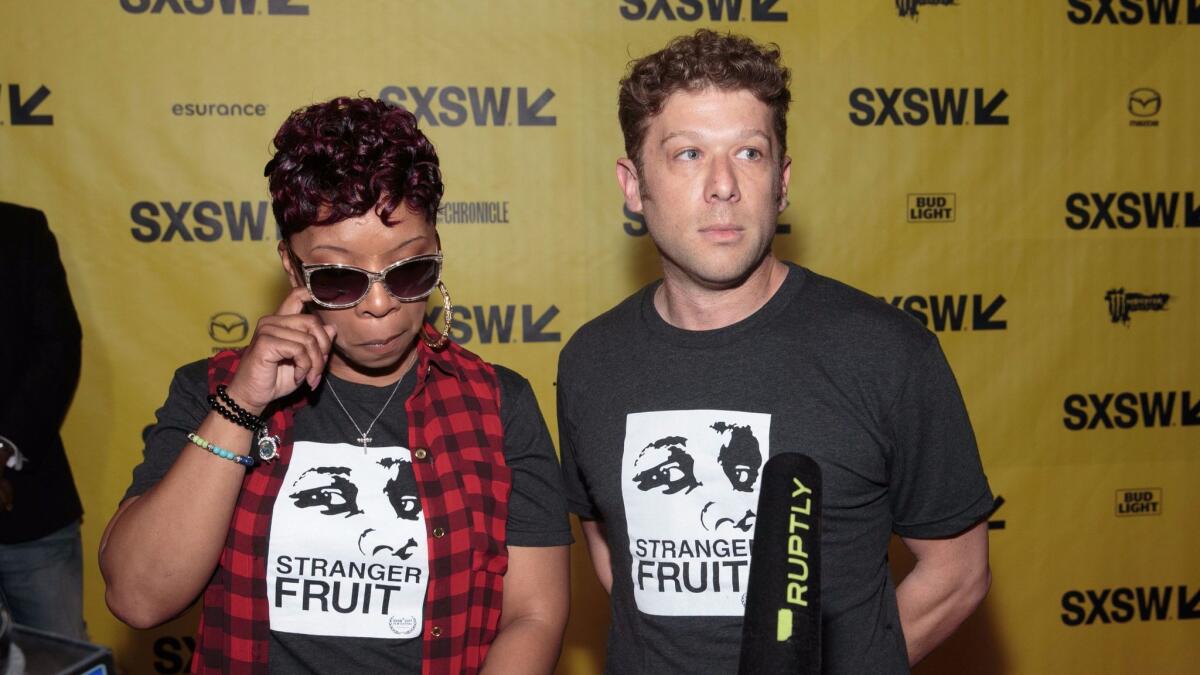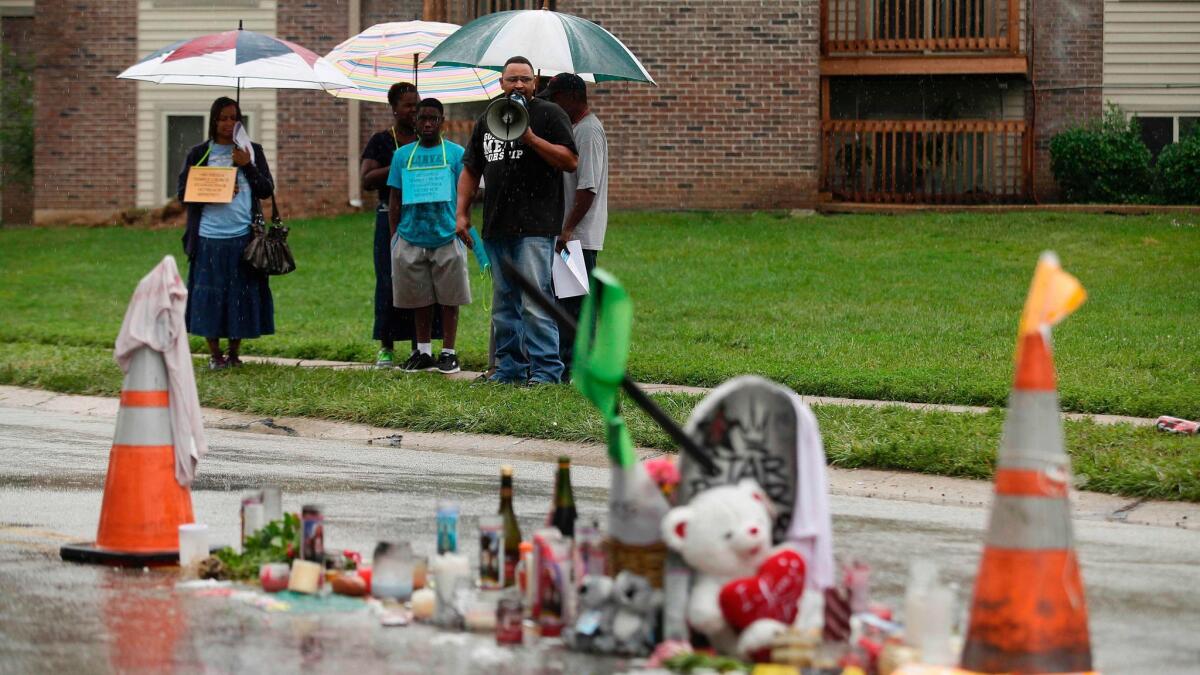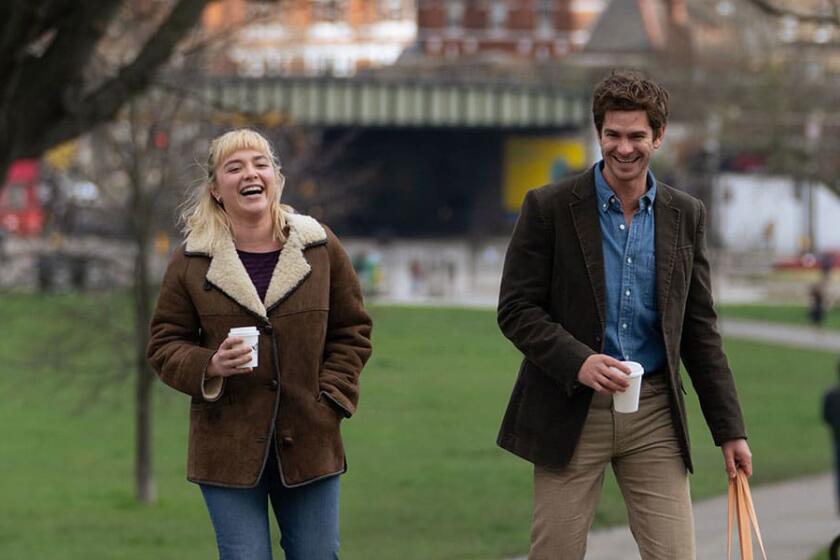New security footage in Michael Brown documentary sparks debate: nonsense or coverup?

Reporting from Austin, Texas — Even before the start of the screening for “Stranger Fruit,” the world premiere for the documentary about the shooting of Michael Brown, the room was charged with emotion. Filmmaker Jason Pollock, unannounced and without a microphone at the Saturday afternoon event, part of the South By Southwest Film Festival, introduced Lezley McSpadden, mother of the unarmed 18-year-old Brown, the recent high school graduate who was killed by police officer Darren Wilson in August 2014, sparking a wave of protests in Ferguson, Mo.
“This is not fun for us. This is not a glamorous premiere. We do not want to be doing this,” Pollock said, his voice cracking.
“She’s a grieving mother. She did not have to be the leader of a movement right now,” he continued. “She did that for us. And has been doing that for us ever since her son was murdered in the street. So we did this because we felt like people forgot about the Mike Brown conversation within the Ferguson conversation.”
Before asking for a moment of silence for Brown, Pollock said of the Ferguson Police Department and the St. Louis County prosecutor’s office, “They did not want us talking about what is in this movie. They did not want the media talking about it, that’s why they didn’t find it. But we did.”
What happened to Mike is one of the terrible American stories of our time. What happened to Mike has defined our generation.
— Jason Pollock, filmmaker of ‘Stranger Fruit’
The film — with end credits that include the subtitle “The Cover-Up of Mike Brown” — attempts to piece together the events that led to the deadly encounter between Brown and Wilson (with Brown’s body being left in the street for more than four hours on a sweltering summer day), and the subsequent work of the legal system that saw no charges filed against Wilson.
The film in particular looks to reframe the narrative of Brown’s last day, including the altercation at a local convenience store just before Brown’s encounter with Wilson. In a video widely distributed after the shooting, Brown is seen leaving the store without paying for a package of Swisher Sweet brand cigarillos.
A police radio call would go out about a robbery at the convenience store, giving a description of Brown. The film also presents conflicting testimony as to whether Wilson heard that radio call before stopping Brown walking down the middle of the street.
A second video, which according to Pollock is seen for the first time in “Stranger Fruit,” shows Brown at the same convenience store in the early-morning hours of that same day, around 1 a.m. on Aug. 9. As posited by the film, Brown appears to trade something, possibly a small bag of marijuana, for what would become the fateful cigarillos. Brown leaves his package behind the counter, leading to the film’s theory that the later video shows him returning to retrieve his items, rather than taking them in the first place.
“Today is a historic day, because you are the first people to see that Mike did not rob the store,” Pollock said in the question-and-answer session after the film. “I’ve been protecting it so that it came out correctly within the context of the facts of the case and it wasn’t bastardized by our media. But it does prove the coverup because [the police] had that video the whole time and they knew that Mike didn’t steal anything from that store and they told the whole world that he was a robber, right after they murdered him.”
At a Monday news conference, however, St. Louis County prosecuting attorney Robert McCulloch said of Pollock’s stance on the case and the video, “What this guy’s putting out is just nonsense.”
He denied that the store clerks were involved in any kind of drug deal.
“There was certainly an attempt to barter for these goods,” McCulloch said. “There was no transaction between Mr. Brown and the store employees.”
Jay Kanzler, attorney for Ferguson Market & Liquor, said Pollock didn’t show the full sequence of events in the new security footage. “There was no deal. There was no pot left behind. There was no understanding,” Kanzler said to CNN. “They gave the pot back. And there was this argument.”
At a panel discussion on the film at SXSW on Monday afternoon, Pollock, appearing with several supporters of Brown, including the teen’s father, Michael Brown Sr., said the group was a little late because they had all been watching the CNN interview with McCulloch. “We literally walked over here to respond to Mr. McCulloch’s ridiculous claims,” Pollock said.
Full coverage: South by Southwest Film Festival »
“The film is really what we want people to be talking about, which is why we decided to release the tape early and get it out of the way,” Pollock said. “The film is about the physical evidence at Canfield [Drive],” where the shooting took place. “The ballistic evidence, the forensic evidence, the audio tape, the blood evidence. If Michael Brown was a white kid, Darren [Wilson] would have been in jail three years ago. ”
Of McCulloch and Kanzler’s disputes with Pollock’s interpretation of the film’s newly seen surveillance footage, the director said Brown “hands the bag back over the counter and you see them put the bag back behind the counter. I fade to black at that point. I did not feel it was necessary to show any more in my movie because the exchange was over. Michael had left the store.”
After Brown leaves the store, Pollock continued, “they take the cigarillos out of the bag. But they didn’t give the weed back. The exchange already took place.”
In the store footage recorded not long before the shooting, the director continued, Brown “was going back to get the product that he was given [earlier], which you can clearly see him being given. They put the cigarillos in the bag themselves and they hand the bag that they created over the counter. So don’t tell me that he robbed the store. And don’t tell me that they were asking for their product back because he wasn’t supposed to take it. Because they gave it to him, on camera. And we can all see it. And anyone with two eyes and a heart who’s not a bigot can see what happened.”

Since the film’s premiere, Pollock has appeared on multiple TV shows, most spectacularly in a heated exchange on CNN’s “New Day.” At Saturday’s screening, where Pollock was joined onstage after the film by McSpadden; Bernard Ewing, Brown’s uncle, and Patrick Green, mayor of Normandy, Mo., a neighboring town to Ferguson, he seemed to anticipate the response his assertions would spark: “Today is the day that we get to start fighting back with the actual facts of this case,” he said. “Because our media failed us.”
“It’s convenient to frame the African American community in a frame that historically has defined us in a negative way,” said Green. ”And particularly when it tugs at the fundamental principles and values in this country that we don’t want to admit to, which is the denial that there is a system in place, an institution, that a privilege that one has that the other does not.”
Green added of the legal findings in the case, “This was about protecting an institution over a life.”
The quiet, spellbinding presence of McSpadden on Saturday was a strong anchor in the room, a reminder that this story is about the loss of a young life. Last year she published a memoir, “Tell the Truth and Shame the Devil: The Life, Legacy and Love of My Son Michael Brown.” She’s also been active with the group Mothers of the Movement alongside mothers of others killed by police or gun violence.
She spoke only once from the stage, saying, “That was my first child, my firstborn son, and it hurt me to watch him learn how to walk and ride a bike and fall and hurt himself during those times, so to get to see and know that my son would never walk again has driven me to this point,” she said.
“And I do have three other children, one being a 12-year-old son, and if I don’t fight for him, nobody is. I’m his mother. I carried him and he will forever be with me. Even if we get a little bit of justice that’s still not enough for me, because this should have never happened. The truth is what keeps me going, and I want everyone to know the truth and it’s brought me here and to this.”
The truth is what keeps me going, and I want everyone to know the truth.
— Lezley McSpadden, mother of Michael Brown
After the screening, Pollock spoke to the L.A. Times. He previously worked with Michael Moore on the documentary “Fahrenheit 9/11” and co-founded founded the Traverse City Film Festival in Michigan. He also directed the 2008 feature documentary “The Youngest Candidate,” about teenagers running for political office.
After seeing initial news reports on Brown he felt compelled to go to Ferguson.
“What happened to Mike is one of the terrible American stories of our time. What happened to Mike has defined our generation,” Pollock said.
“I just felt the spark of the protests deserved the correct narrative. So while everyone was talking about the protest and the movement, I wanted to talk about correcting the narrative that started that,” he added. “And everybody forgot about that and nobody talks about those 95 seconds. That film is 95 minutes on 95 seconds.”
As to the importance of the uncovered surveillance video from the convenience store, Pollock sees it as vital new evidence.
“It shows the intention of the Ferguson Police Department to trick us and to make us think that Mike robbed the store when he did not. And that shows that they were covering up what Darren did,” Pollock said. “It really does show that they chose to show us half a video and for 2½ years the world has been thinking that he robbed the store. And today we see the missing piece of the puzzle.
“The real coverup in Ferguson was the coverup of Mike Brown’s character,” Pollock said. “This is a great family. This is terrible what they did to them.”
On Monday, Pollock had this to say about the divided views of what happened on that August day in Ferguson: “I think that Michel Brown has become this touchpoint issue where the way you feel about him is the way you feel about America, is the way you feel about race, is the way you feel about your neighbor. And he exposed that in all of us. And he is exposing it again.”
SIGN UP for the free Indie Focus movies newsletter »
Follow on Twitter: @IndieFocus
ALSO
South By Southwest Film Festival: a heady blend of action comedy and discovery
Charlize Theron and James McAvoy blow through South by Southwest with ‘Atomic Blonde’
Edgar Wright’s ‘Baby Driver’ is an action-musical thrill ride at South By Southwest
Ridley Scott and cast unveil unseen ‘Alien: Covenant’ footage at SXSW
More to Read
Only good movies
Get the Indie Focus newsletter, Mark Olsen's weekly guide to the world of cinema.
You may occasionally receive promotional content from the Los Angeles Times.











